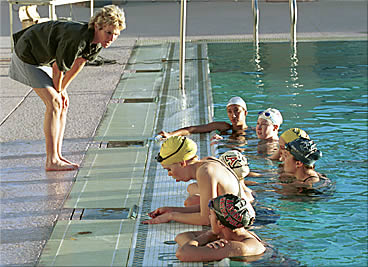When a coach is successful, the whole team reaps the benefits.
But sometimes, success comes at a high price.
Such is the case for the men and women who coach club sports at the University of Arizona. The reality of coaching club sports is that it's rare to find coaches who devote their time entirely to coaching.
Holding down a variety of other jobs, ranging from television sports announcers to U.S Geological Service student technicians to bartenders to travel agency owners, all these people have one thing in common: They coach club sports because they love it, regardless of time and money constraints.
Men's head rugby coach Dave Sitton is an owner of the energy drink company Global NRG and does the play-by-play for the Arizona men's football and basketball teams for Fox Sports Net.
In all, Sitton said he spends about 80 hours a week with his various jobs and coaching, not to mention the time he spends with his wife and two daughters.
"Sleep is the one activity that really gets cut," said Sitton, who has been involved in the UA rugby program for 29 years.
But the sacrifice is worth it because, "I'm truly in love with everything I do."
Nancy Purdin, the women's head rugby coach, is another person who juggles a career and club coaching duties.
Purdin works 50-60 hours a week at the travel agency she owns and spends about 12-14 hours a week coaching.
Free time is just one of the things lost as the result of being a coach money is a close second.
Head men's volleyball coach Steve Carlat earns about $10,000 a year, as opposed to varsity volleyball coaches who earn anywhere from $40,000 to $80,000 a year, said Skip Greenburgh, the team's assistant coach and club director.
Greenburgh himself earns only $8,100 a year, even though his position is full time.
 |  |  |
 |  |  |
 |  |  |
 | | MATT HEISTAND/Arizona Daily Wildcat | | UA synchronized swimming coach Jill Ranucci critiques the A team after a run-through of its routine. |
|  |
 |  |  |
Still other coaches must work several jobs just to make ends meet.
Men's lacrosse head coach Adam Hopkins and women's lacrosse head coach Beth Duschatko are two first-year coaches who are balancing jobs and coaching club teams.
Duschatko is a student technician at the U.S. Geological Services and works at a coffee shop.
"It's hard," Duschatko said. "I can't have a regular 9 to 5 job. I have to be here (with the lacrosse team) from 4 to 6 (p.m.) and on weekends."
Hopkins said he has had to work fewer bartending shifts because his team has started playing more games.
He estimated that he spends eight hours a day working on lacrosse-related activities and only 4-10 hours a week working at his job.
But the ironic thing is that many of these coaches say the time and money aren't a problem. Their efforts have paid off, and the champion UA men's volleyball club team is an example: Assistant coach Greenburgh helped fund-raise for the team right out of his own home, sending 5,000 letters to companies and following the letters with phone calls. He networked with big business owners for five years to get money for scholarships that all members are eligible to receive, depending on personal circumstances.
The team's annual budget of $150,000, which also covers coaches' salaries and travel, includes only $1,500 from ASUA.
"I never thought it would get this big," Greenburgh said.
The majority of funding for club sports comes directly from the players and fund raising, and depending on the team some of that money could go toward coaches salaries. Off-the-field duties including field reservation, travel plans and finances are handled by both the coaches and the players.
Coaches like Sitton, Purdin and Duschatko receive no monetary payment for their work as coaches, while Hopkins gets $10,000 a year a salary that comes directly from his players.
"It's kind of funny," Hopkins said. "They pay me to make them run."
Despite the financial downfall, Sitton said every coach on his staff is there because they truly enjoy coaching.
"The thing I'm most proud of is that every one of the coaches is a volunteer," he said.
All of the club coaches have different reasons for coaching, but in general, most say they just love teaching.
"The biggest benefit of being a coach is seeing the kids respond," Hopkins said. "It gets exciting when guys are buying into the system you taught them."
Purdin said he likes how his players are very enthusiastic when they learn something new. However, he and other coaches said they must deal with the baggage that comes with clubs sports.
"It's a constant struggle," Purdin said about dealing with the travel arrangements and fund-raising aspects.
But these coaches have accepted the continuous battle to keep up with coaching club sports.
"It's a double-edged sword. It's the most gratifying experience and at times, it's a nightmare," Sitton said.

